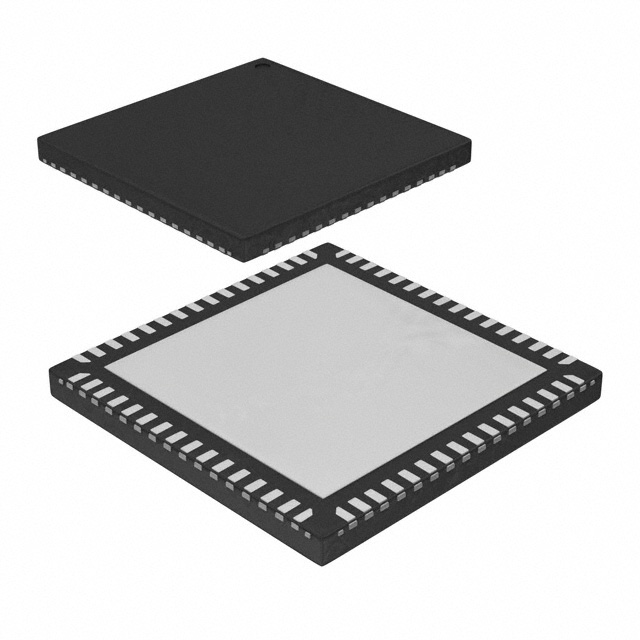AT90CAN128-15MT1
Product Overview
Category
AT90CAN128-15MT1 belongs to the category of microcontrollers.
Use
This product is commonly used in various electronic applications that require a microcontroller for processing and controlling functions.
Characteristics
- Microcontroller with advanced features
- High-performance and low-power consumption
- Suitable for automotive applications
- Can handle complex tasks efficiently
Package
AT90CAN128-15MT1 is available in a compact and durable package, ensuring easy integration into electronic devices.
Essence
The essence of AT90CAN128-15MT1 lies in its ability to provide reliable and efficient control over various electronic systems.
Packaging/Quantity
This product is typically packaged individually and is available in varying quantities depending on the manufacturer's specifications.
Specifications
- Microcontroller Model: AT90CAN128-15MT1
- Operating Voltage: 2.7V to 5.5V
- Flash Memory: 128KB
- RAM: 4KB
- EEPROM: 4KB
- Clock Speed: 16MHz
- Number of I/O Pins: 53
- Communication Interfaces: CAN, SPI, UART, I2C
- ADC Channels: 8
- Timers/Counters: 6
Detailed Pin Configuration
The pin configuration of AT90CAN128-15MT1 is as follows:
| Pin Number | Function | |------------|----------| | 1 | RESET | | 2 | VCC | | 3 | GND | | 4 | XTAL1 | | 5 | XTAL2 | | ... | ... | | 53 | ADC7 |
Functional Features
- Advanced control capabilities
- Support for multiple communication interfaces
- Efficient data processing and storage
- High-speed operation
- Built-in analog-to-digital converter (ADC)
- Timers and counters for precise timing control
Advantages and Disadvantages
Advantages
- Versatile microcontroller suitable for various applications
- Low power consumption
- Robust and reliable performance
- Ample memory for data storage
- Support for multiple communication protocols
Disadvantages
- Limited number of I/O pins compared to some other microcontrollers
- Relatively higher cost compared to entry-level microcontrollers
Working Principles
AT90CAN128-15MT1 operates based on the principles of digital logic and microcontroller architecture. It executes instructions stored in its memory, processes input signals, and generates output signals accordingly. The microcontroller's internal components work together to perform tasks such as data processing, communication, and control.
Detailed Application Field Plans
AT90CAN128-15MT1 finds applications in various fields, including but not limited to: - Automotive systems - Industrial automation - Consumer electronics - Medical devices - Robotics
Detailed and Complete Alternative Models
Some alternative models that offer similar functionality to AT90CAN128-15MT1 are: - ATmega128 - PIC18F458 - STM32F407
These models can be considered as alternatives depending on specific project requirements and compatibility with existing systems.
In conclusion, AT90CAN128-15MT1 is a versatile microcontroller with advanced features suitable for a wide range of electronic applications. Its high-performance capabilities, efficient control, and support for various communication interfaces make it a popular choice among developers.
Lista 10 Vanliga frågor och svar relaterade till tillämpningen av AT90CAN128-15MT1 i tekniska lösningar
Sure! Here are 10 common questions and answers related to the application of AT90CAN128-15MT1 in technical solutions:
Q1: What is AT90CAN128-15MT1? A1: AT90CAN128-15MT1 is a microcontroller from Atmel, specifically designed for automotive applications. It features a high-performance 8-bit AVR RISC architecture with integrated CAN controller.
Q2: What are the key features of AT90CAN128-15MT1? A2: The key features include 128KB Flash memory, 4KB EEPROM, 4KB SRAM, 53 general-purpose I/O pins, 32 general-purpose working registers, and a wide range of communication interfaces.
Q3: What are the typical applications of AT90CAN128-15MT1? A3: AT90CAN128-15MT1 is commonly used in automotive systems such as engine control units (ECUs), body control modules (BCMs), instrument clusters, and other applications that require CAN bus communication.
Q4: Can AT90CAN128-15MT1 be used in non-automotive applications? A4: Yes, although it is primarily designed for automotive applications, AT90CAN128-15MT1 can also be used in other industrial control systems, robotics, and any application that requires CAN bus communication.
Q5: What programming language is used for AT90CAN128-15MT1? A5: AT90CAN128-15MT1 can be programmed using C or assembly language. Atmel provides a development environment called Atmel Studio, which supports both languages.
Q6: How can I program AT90CAN128-15MT1? A6: AT90CAN128-15MT1 can be programmed using an In-Circuit Serial Programming (ICSP) interface. You can use a programmer/debugger like Atmel-ICE or AVRISP mkII to connect to the microcontroller and program it.
Q7: What is the maximum clock frequency of AT90CAN128-15MT1? A7: The maximum clock frequency of AT90CAN128-15MT1 is 16 MHz. However, it also supports lower clock frequencies for power-saving purposes.
Q8: Can I interface AT90CAN128-15MT1 with other microcontrollers or peripherals? A8: Yes, AT90CAN128-15MT1 has multiple communication interfaces such as SPI, I2C, UART, and CAN bus, which allow you to easily interface with other microcontrollers or peripherals.
Q9: Does AT90CAN128-15MT1 have built-in analog-to-digital converters (ADC)? A9: Yes, AT90CAN128-15MT1 has an 8-channel, 10-bit ADC that can be used to convert analog signals into digital values for further processing.
Q10: Is AT90CAN128-15MT1 suitable for real-time applications? A10: Yes, AT90CAN128-15MT1 is suitable for real-time applications due to its high-performance architecture, integrated peripherals, and support for interrupt-driven programming.
Please note that these answers are general and may vary depending on specific requirements and implementation details.


